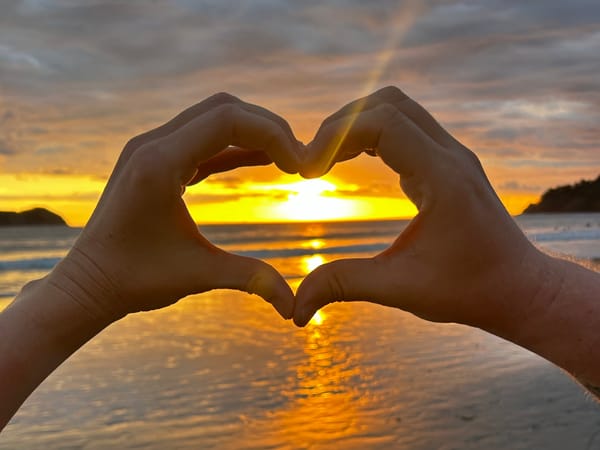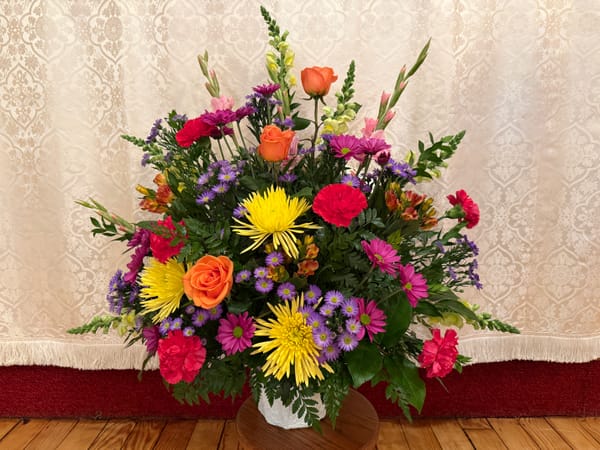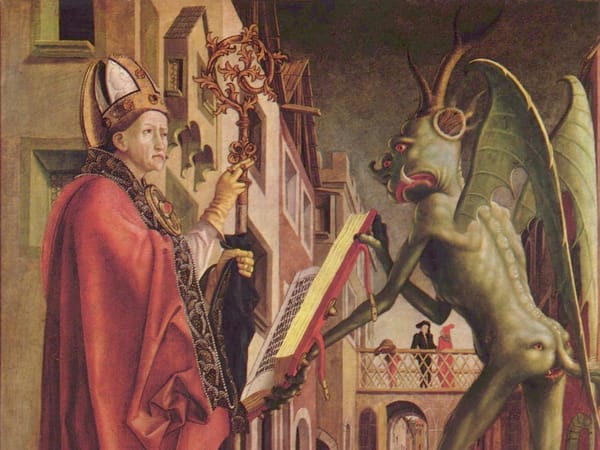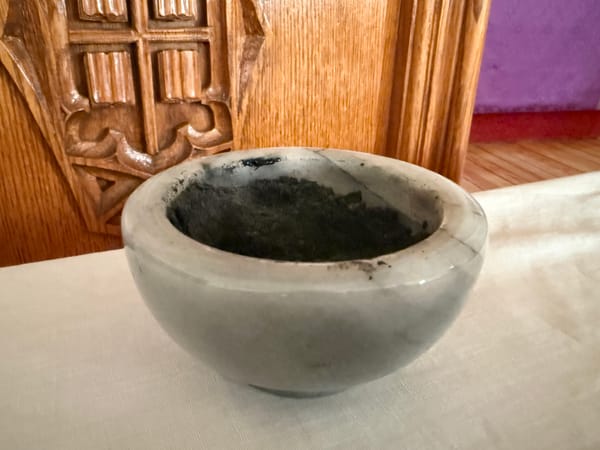All Means All: Nationalities, Sexualities, Everyone
We must find ways to live and advocate for love in our own families, in our communities, in our nation, and in our world that so desperately needs it.

June 22, 2025 - The Second Sunday after Pentecost
My friends, I speak to you today in the name of one God, Father, Son, and Holy Spirit. Amen. Please be seated.
Good morning, Epiphany. Yesterday, on June 21st, our little community here celebrated two birthdays that I know of, and my family attended two parties. The first was for little Rose Montgomery, Erika Jo’s daughter, who I believe turned nine yesterday. She had pizza and cake at Erika Jo and Brian’s house, more than a dozen kids in attendance, and a nice inflatable water slide for what turned out to be a very hot day. The second birthday party was for my mom, Joni, who turned 72. We did not have a water slide at her party, as you might imagine, but we did have cake, and my daughters got to hear stories of my mom’s ten years living in Brazil, where she moved as a missionary kid at the age of nine. We gave Grandma Joni a framed photo of her grandkids, and Abbey found a website that made socks printed with photos of the girls’ heads. We smiled and laughed last night.
And then as we sat around their house talking, we heard that the American government had dropped bombs on Iran. We turned on the news around 8 pm ET; I hope I’m not breaking this news to anyone here this morning. As we found out a few hours later when the President addressed the nation from the White House, American bombs were dropped on nuclear sites in Fordow, Isfahan, and Natanz, following a week of conflict. That conflict was started by Israel on June 13th with bombing attacks that targeted all of Iran’s top military leaders. Iran responded in kind, bombing targets throughout Israel with drones and missiles. And Israel fought back, targeting cities and government buildings. Many people have died. It is far too soon to say what Iran’s response to our bombs will be, but I will always fear that violence begets violence, and it would seem this morning that the United States has joined another violent war in the Middle East, a region that has seen untold violence with world-spanning violent consequences for far, far too long.
...In one of the relatively peaceful years in recent times, I was privileged to spend a brief summer in the Middle East, studying at a university in downtown Cairo, Egypt. As part of my bachelor’s degree in history, I took two courses just steps from Cairo’s main plaza, courses entitled “A Survey of Arab History,” and “Modern Middle Eastern Politics.” I wrote papers in the famous bazaar Khan el-Khalili, I walked past the famous Egyptian Museum on my daily walk to class, and yes, I rode a camel around the pyramids, like every good tourist has to do. But being in classes in Cairo brought me into relationships too, a few close ones with my American classmates, but also many with the international students studying there. My roommate was a man named Kim from Norway who was really into death metal music, and he still sends me Facebook messages on my birthday... I had conversations in and outside of class with students from Lebanon, Sudan, Jordan, Saudi Arabia, Turkey, and yes, from Israel and Iran. One of my most vivid memories is a road trip we took to Mt. Sinai, where I climbed the mountain in the dark for sunrise at the top with my American friends... and descended it with four other students, four twenty-somethings who wanted to take the more adventurous descent, four men from Iran.
Now what you learn by living abroad, by building relationships with people who live in other countries, what you learn is that borders are just a human construct, and not always a helpful one. People from every nation share most of the same goals and hopes for their lives: they want to be able to provide for their families, they want a good job, meaningful work, they want to have free time to enjoy their hobbies, they want to be free to live how they choose to live, they want to be loved... they want to be able to celebrate their children’s birthdays and their parents’ birthdays as comfortably as my family did yesterday. But for people in Iran, in Israel, in Ukraine, in so many nations yesterday, those birthday parties were not celebrated in peace. Lives ended, lives ended thanks to violence, thanks to seeing others as a threat rather than as people, thanks to seeing difference as dangerous rather than as a gift of an endlessly delighting/creative God.
Now this sermon was quite different yesterday morning, but I found when I sat down to rewrite it from scratch early this morning that the lectionary texts still fit, and the Holy Spirit, well, she knows what she is doing. The sermon yesterday was initially going to be focused on the Pride festival this coming Saturday here in South Haven, thanks to our second reading from the letter from Paul to the Galatians, and it still is. Let’s dive in.
In this part of his letter to the churches in Galatia, which is a region in modern-day Turkey, Paul is discussing the law, Jewish law. A main theme of the entire book of Galatians is the importance and wide-ranging impact of Christ. But Jewish Christians with influence in the early churches of Galatia were trying to enforce parts of the Mosaic Law, what we know in part as the Old Testament, on Gentile Christians who had never practiced the Jewish faith. The Jewish Christians saw Christ as a fulfilment of their prophecies, yes, but they had not quite come to fully accept those who were different from them, and they hoped to bring them into their already existing faith tradition, teaching them what they needed to do and how they needed to act in order to earn their salvation. Old beliefs die hard. Paul instructs and reminds them in this letter that Christians do not earn their salvation through their works, they need not be burdened by slavery to the law, but they stand justified by their faith. Simply by believing and living a life inspired by Christ’s love will they be saved. Next week in Galatians, we’ll read about the fruits of this life: love, joy, peace, patience, kindness, generosity, faithfulness, gentleness, and self-control. A life marked by these fruits is a deeply Christian life, it is life worth living.
Witnessing lives marked by the fruits of the Spirit is what led the Episcopal Church to affirm the equal standing of LGBTQ persons nearly 50 years ago. Next year is the 50th anniversary of the 1976 General Convention where our denomination adopted resolutions stating “homosexual persons are children of God who have a full and equal claim with all other persons upon the love, acceptance, and pastoral concern and care of the Church,” and that they “are entitled to equal protection of the laws with all other citizens.” Now adopting a resolution did not make instantaneous change for the better, as people in this room know full well. But this church has gradually – sometimes slowly, but sometimes boldly – this church has thankfully been moving toward full acceptance of all people for a very long time, for longer than I have been alive (and I have a head full of gray hairs).
In one of the most ardent defenses of the LGBTQ community over the past 50 years, Episcopal church leaders leaned into the writings of Paul found in Galatians. They argued that if LGBTQ Christians exhibited those fruits of the spirit – love, joy, peace, patience, kindness, generosity, faithfulness, gentleness, and self-control – then the heterosexual community would be committing the same mistake the Jewish Christians of Galatia were committing: denying God’s power to form all of us, restricting the bounds of Christ’s love, refusing to allow the Spirit to work in someone’s life because they were not slaves to the law. In today’s passage, Paul writes that the law was the Jews’ disciplinarian, it kept them guarded until Christ could be revealed. But we no longer live under law, we are no longer subject to a disciplinarian, for in Christ Jesus, we are all children of God.
Paul continues by writing one of his most important sentences, one of the most important verses in the entire New Testament, one that we need to hear this morning, one that we need to shout from the rooftops when we consider public policy and going to war. “There is no longer Jew nor Greek, there is no longer slave nor free, there is no longer male nor female; for all of you are one in Christ Jesus.” There is no longer Jew nor Greek, there is no longer Iranian or Israeli, there is no longer straight nor gay, there is no longer cisgender or transgender, there is nothing, no label, no decision, no nationality, no ethnicity, no race, no sexuality, there is nothing that divides us from each other in Christ.
We know this is true most clearly when we are in relationships with those we might consider different from us. I myself had opinions about the LGBTQ community before I had any gay friends. Those opinions were misguided, they were bigoted, they came from an ignorance I was too naïve to know I held. But in becoming friends with LGBTQ Christians, in building relationships, I was able to see the Spirit at work in their lives too, I was able to see that they shared the same hopes and goals for my life that I and all my straight friends held, and those bigoted, misguided opinions fell away like so much dust. It is through relationship that we all are changed; not only the other, but us as well.
Many of you know this is true thanks to your own relationships, you have become friends with people who have changed your lives, changed your opinions. You may have done this across societal boundaries, whether they be sexuality or race or country of origin or socioeconomic status. You may have done it while here at Epiphany, because of your time at Epiphany. I encourage you this morning to continue to look for opportunities to be changed by interaction with someone you disagree with. That may be Democrats trying to really understand Republicans (and vice versa), that may be straight people attending Pride next weekend, signing up to sit at our table where we’ll just tell people there’s a church that loves everyone, no exceptions.... If I had the ear of the President, I’d ask him to get to really know an Iranian family, to eat a meal in their home, to hike a mountainside with them at sunrise, to attend an Iranian child’s birthday party, I’d ask him to make sure he does those things and sees them as people before he drops any more bombs.
If there really is no Jew nor Greek, if there really is nothing that divides us because we are all one in Christ Jesus, all Abraham’s offspring, all heirs according to the promises of God if we’d only choose to live in Christ’s love... then we must stop hating. I know you do it, we all do, we sinfully hold contempt in our hearts for those who are different from us, who hold different opinions. But we are invited to love as God loves. We are invited to love without any condition the Israeli and the Iranian, the Ukrainian and the Russian, the Democrat and the Republican, the powerless and the President, the immigrant and the native-born, the straight and the gay and the transgender and all the rest. And for all their sake, we must speak out in love against those who use violence, hate, missiles, and legislation to oppress those we love, which if you’ll remember, is everyone.
We must find ways to live and advocate for love in our own families, in our communities, in our nation, and in our world that so desperately needs it. May we all seek and find new ways to love, and love everyone, today and tomorrow and all the days after that. Amen.




